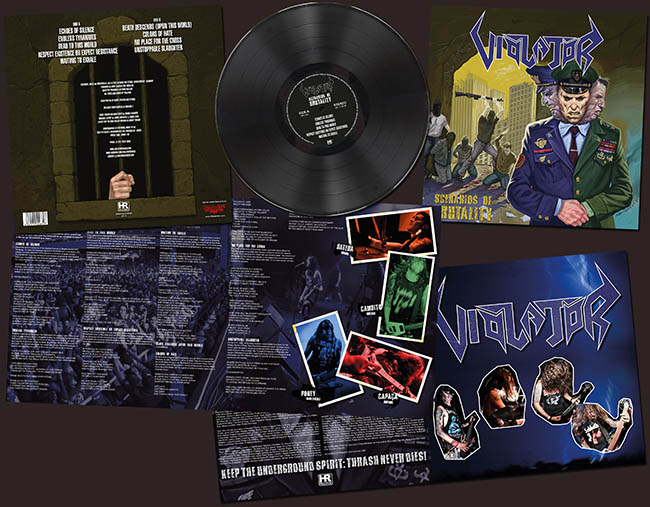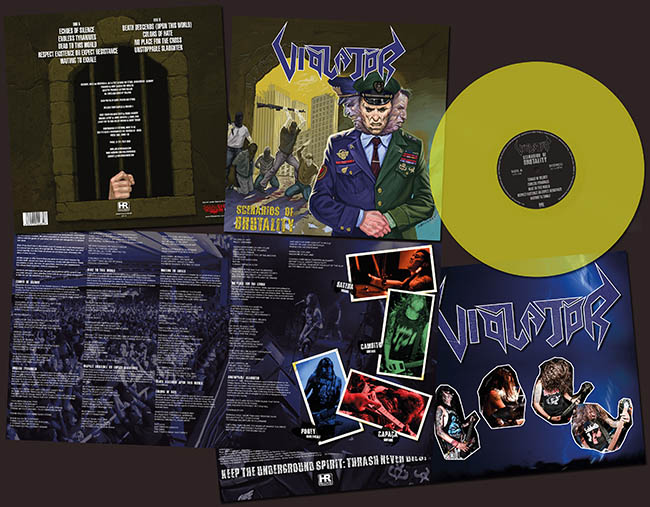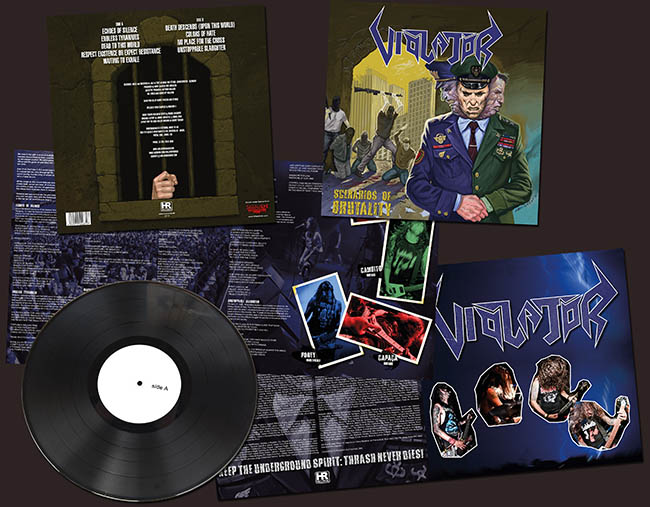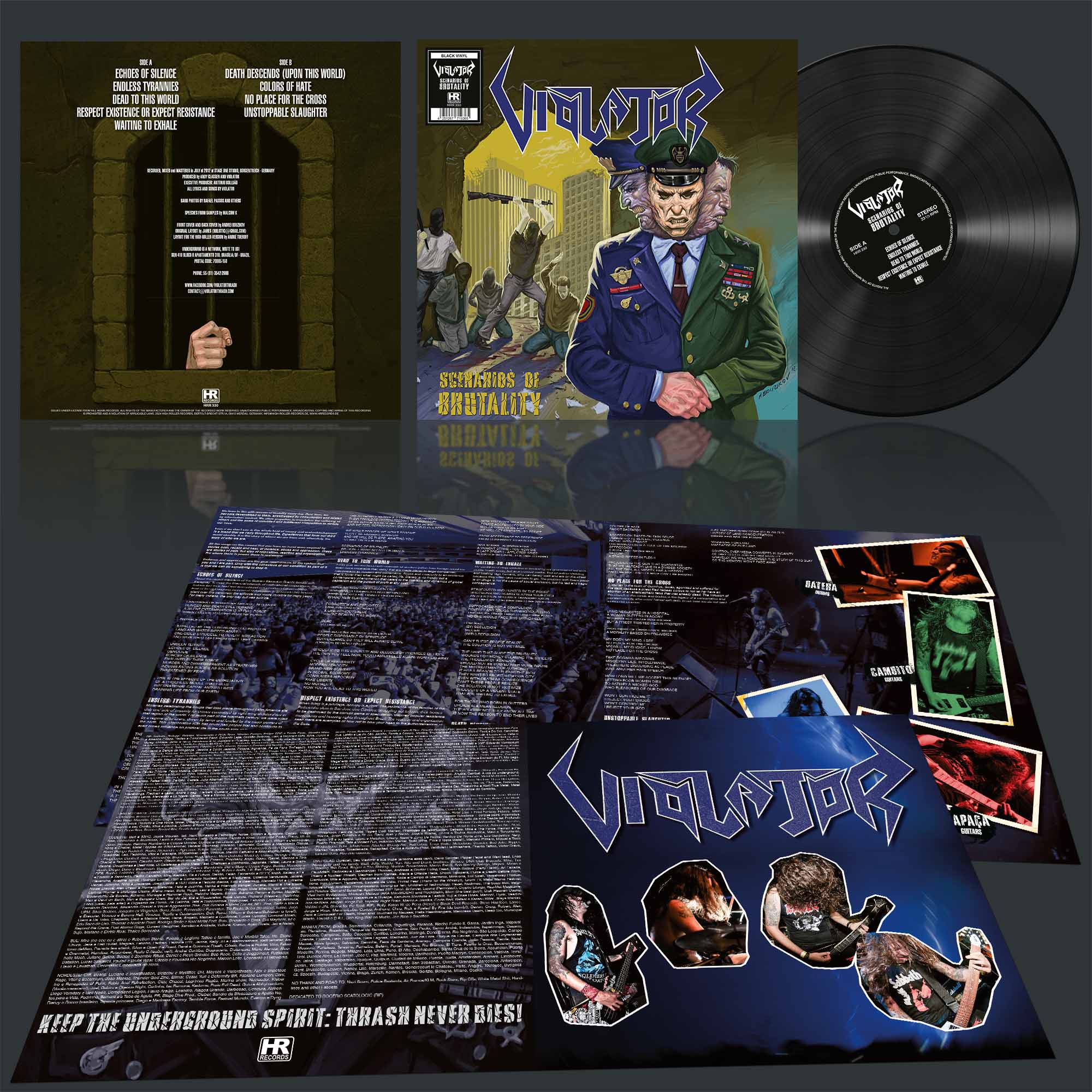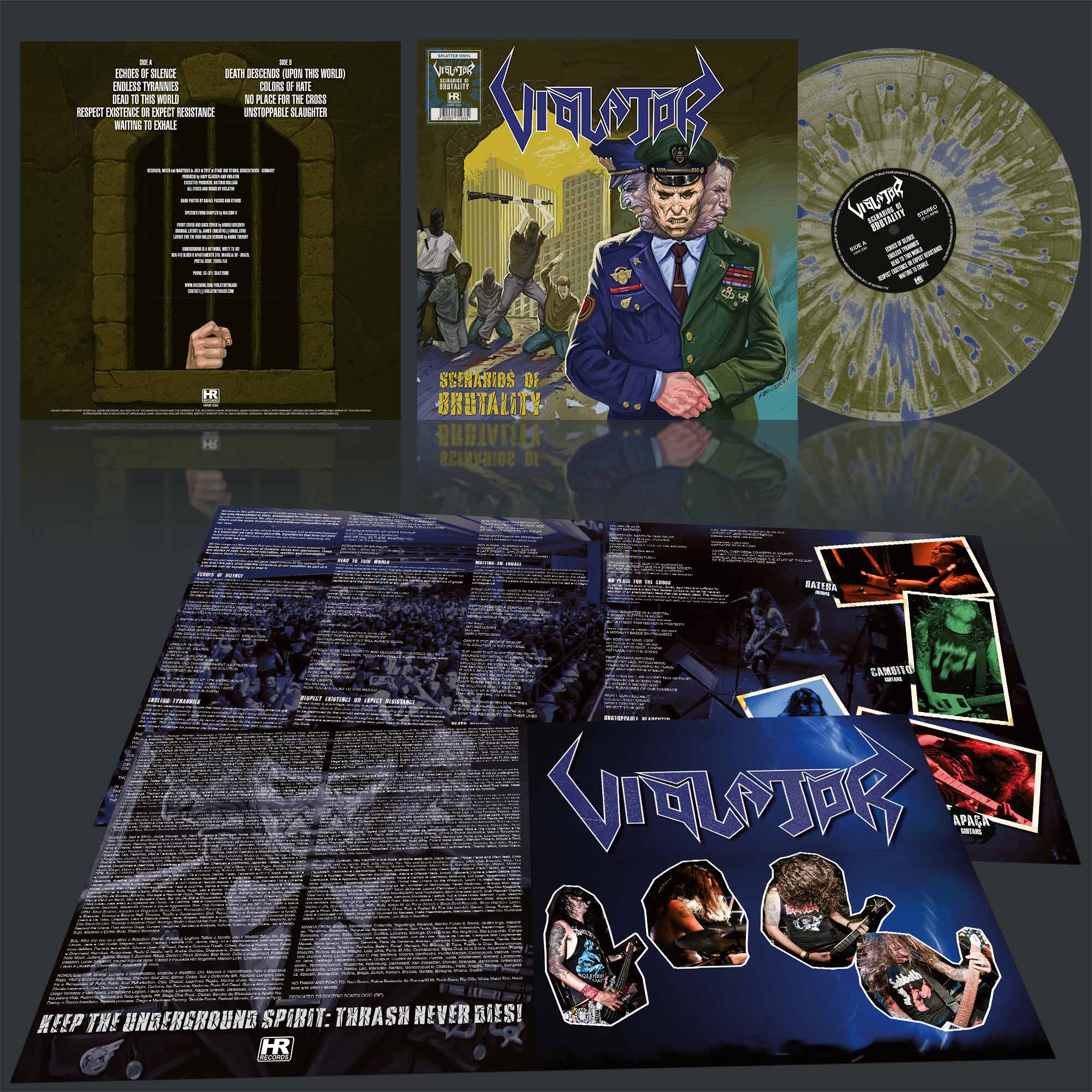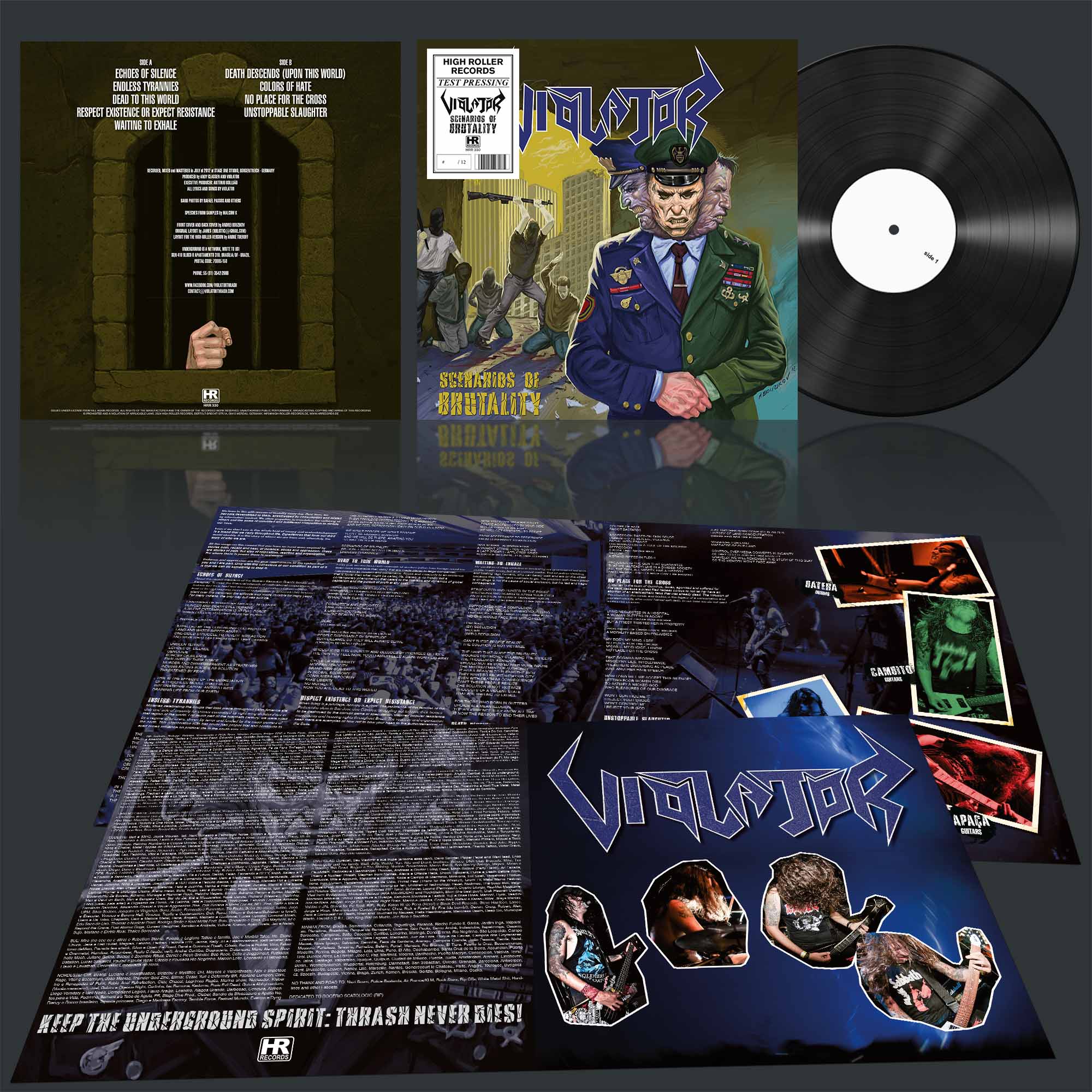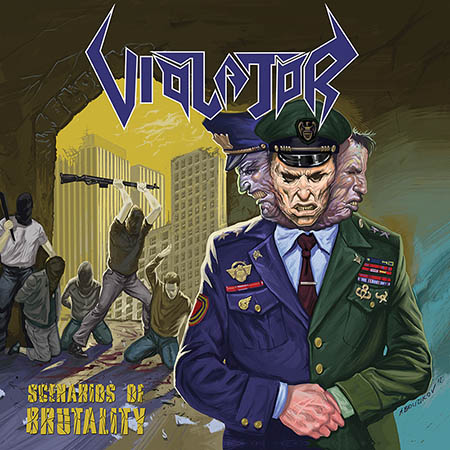 | ||||
| VIOLATOR - Scenarios of Brutality LP | |
HRR 330, ltd 500, 150 x piss yellow vinyl + 350 x black vinyl, 425gsm heavy cardboard cover, 4 page insert, 2nd pressing: ltd 500, 200 x black + 300 x swamp green/ blue jay splatter vinyl | |
| Pedro "Poney Ret" Arcanjo - Vocals, Bass Marcio Cambito - Guitars Capaça - Guitars Batera - Drums | |
| -Echoes of Silence -Endless Tyrannies -Dead to This World -Respect Existence or Expect Resistance -Waiting to Exhale -Death Descends (Upon This World) -Colors of Hate -No Place for the Cross -Unstoppable Slaughter | |
| 1st pressing: SOLD OUT! 2nd pressing: AVAILABLE | |
Violator from Brazil’s capital Brasilia formed in early 2002. Having played together since 1999, the four guys set out to be quite different from the bands around back then, as vocalist and bassist Pedro “Poney” explains: “At the time we were really fed up with the metal scene in our city and in our country, because everything seemed so commercially driven, fake or forced, and we wanted to play a music that was more honest, real, visceral and spontaneous. We found that on old thrash albums we got from used record stores.”
After having released a couple of splits, demos and EPs as well as two full-length albums, which were all warmly welcomed in the more informed circles, Violator are now going to put out their third proper album via High Roller Records. Pedro explains what we can expect from “Scenarios of Brutality”: “I think Scenarios of Brutality shows a more mature Violator. The songs are more complex, they are a product of intense work and explore some aspects of thrash that we never included before.” Violator had a lot of time to mature and develop their own way of playing thrash. For eleven years, the restless bunch put all their skills and experiences in making the most intense, aggressive and violent songs one could possibly write. In that sense, “Scenarios of Brutality” is a logical continuation of its two predecessors; it’s “pure thrash made with heart.” But Violator put even more effort into making the album as good as possible: The band went all the way from Brazil to have “Scenarios of Brutality” recorded, mixed and mastered at Stage One Studio at Borgentreich. On top of that, it was produced by Andy Classen. How did Pedro like the experience of recording in Germany and working with him? “Working with Andy was great. Apart from being a great and easy-going guy, Andy really knows everything about making a great thrash record. He was really dedicated – German work ethics really caught our Brazilian lazy asses (laughs) and we are totally happy with the sound he managed to extract from our music. We wanted a good sound for our music, but with the mess and the energy of old metal albums. That’s what we tried to do.” Thrash was and is still dominated by the big names, but when it comes to name the most important musical influences, Violator’s Pedro is very specific: “As a thrash-nerd, I guess our biggest musical influences are late 80’s records of more intense and brutal bands like Sepultura, Kreator, Sacrifice, Dark Angel, Gammacide and Slayer. Of course we love thrash from all over the world in the most different varieties – from Heathen to Sodom, but those faster bands with complex riffs and picks (but very, very far from anything “prog”) were most important for us.”
Over in Brazil, the big thrash revival has undergone the same inevitable decline as in these parts. Up to 2007, 2008, bands kept popping up and people started playing thrash who had not done so before. Now the wave is retreating, and Pedro welcomes this development, even though he has nothing against experimenting with several kinds of music himself: “I think this is a good opportunity for bands like Violator to prove that this 'thrash revival' wasn’t just another hype. For us, clearly it’s not. We’ve being doing this passionately long before this phenomenon started, and I’m pretty sure we will continue playing thrash even if nobody cares, 'cause we don’t care if anyone cares.” Violator always regarded themselves as a part of the underground network: “We always enjoyed going to concerts, getting to know bands, and promote and help to organize concerts in our city, so we started playing a lot in our local scene, because we were an active part of it. You know, as Lethal Aggression liked to say ‘If you wanna have a scene, than you gotta make a scene’.”
On their facebook page, Violator state they are “not your typical thrash metal band.” What is it that sets them apart from other thrash bands? “Well, that was written by a journalist friend of ours, but I guess what he means is that we have a DIY approach to our band, rejecting big labels' contracts, writing political songs, trying to keep everything as simple as we can, not trying to be ‘at the top’, but on the contrary, to destroy this notion of ‘top and bottom’ in the underground, promoting equal relations between band and audience, as one. I don’t know if this set us apart from the other thrash bands, for me that is what thrash should be.” What clearly does set them apart is this: Violator do not only play angry songs with violent themes as most of their cousins from cosy First World countries do – coming from a city which faces troubles most of don’t even face in our worst nightmares, they know exactly what they are talking about: “It’s impossible to ignore all the brutality that surrounds us. So, in the Scenarios of Brutality album there is a short text we wrote to accompany the lyrics. It explains the whole concept of the album. Each song is inspired by stories of violence, abuse and oppression. These are stories of pain, but also of opposition and reaction. There are songs about the indigenous massacre, women’s rights, homeless people, slave work, racism…. Over time, we've become desensitized to these stories, and the record is a reminder never to forget what’s going on around us.” To convey their message more impressively, Violator also included samples from speeches held by radical human rights activist Malcolm X, one of them being "Anytime you beg another man to set you free, you will never be free. Freedom is something you have to do for yourself “. What is it they want to emphasize by using this sample? “Malcom X is an inspiration to anyone who thinks about resistance and liberty. He also had great thoughts about self-care and the use of violence. Both are things I think are still very important to discuss nowadays. As a record that really wants to talk about the 'real' world, we thought the use of samples from a real speech instead of a line from some movie would add a lot of strength to the record."
Musing over my question if thrash in general should be a lot more political than it is today, Pedro remains indecisive: “I don’t think it’s a matter of ‘should’; empathy and solidarity are nothing you can force people to feel, but I guess we could have a much more political scene than we have nowadays. I guess a lot of things would have to change for this to happen. The first thing would be not to see underground music just as a commodity in the capitalist system (as most of record labels see it), but as a counterculture art from specific communities with their own views of the world. These songs will not change the world, but they already have changed my view of the world and could change a lot more.”
Yet even though “Scenarios of Brutality” will probably not change the world, it already received very positive feedback from far and wide. Asked for any negative reactions, Pedro laughs: “The only bad reviews I have read so far complain about the record being “too fast”, too “old school” and too “straight forward” – well, those are all great compliments for a thrash metal album, I believe.” Too true!
Ulrike Schmitz
